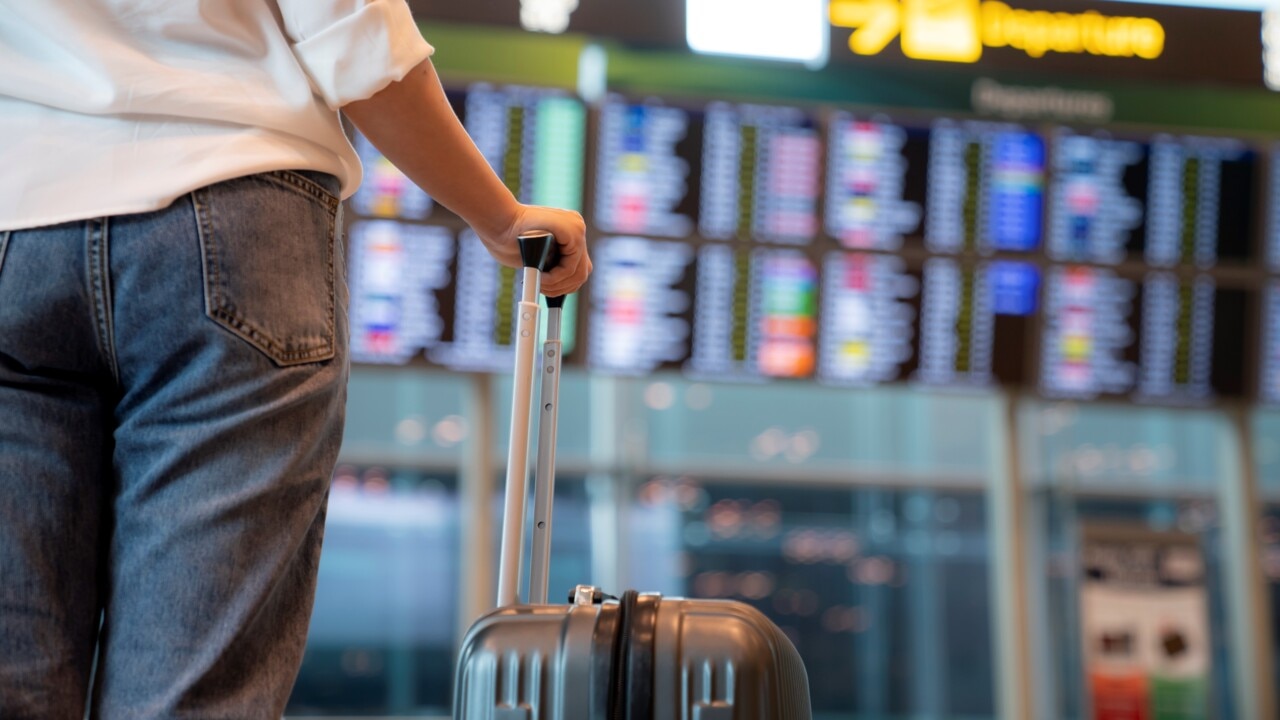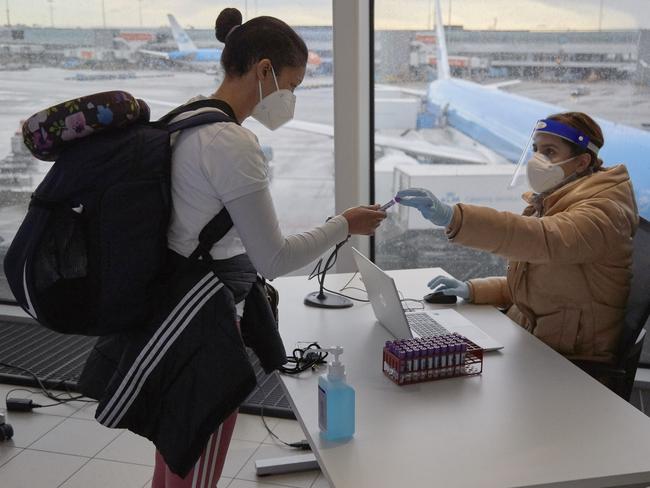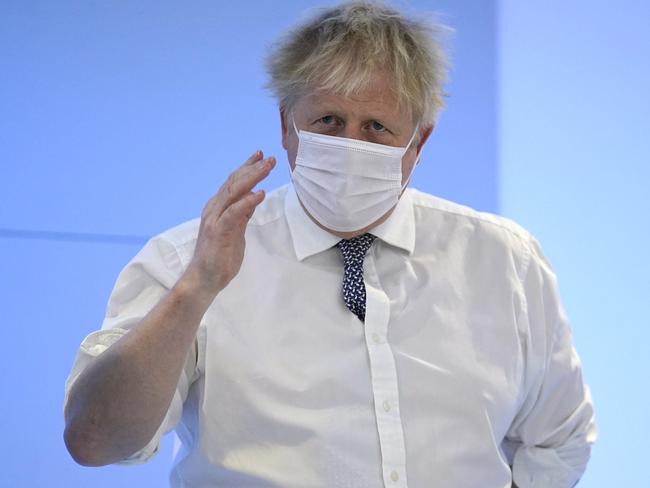Explained: New EU, US travel restrictions on Aussies
What are the latest rules and restrictions facing Australians who are travelling internationally? Here are updates from the EU, UK, and US.

Coronavirus
Don't miss out on the headlines from Coronavirus. Followed categories will be added to My News.
Countries are increasingly taking a new approach to pandemic travel by focusing on a traveller’s individual health status rather than the country they come from.
However, with Omicron cases surging in Australia, the United States and Europe have downgraded Australia’s travel safety rating, and the European Council took Australia off its travel ’white list’, meaning restrictions on non-essential travel for Australians.
Here is how this could affect Australians who choose to travel abroad.

EU
The European Union has identified Australia as a “Covid danger zone” raising concerns Australian tourists could be banned from visiting Europe.
Australia, Canada and Argentina have been classified as “Covid danger zones” by the European Council which recommended entry restrictions not be relaxed for these countries in particular.
This means Australia will be removed from the ‘white list’ of countries and new testing and self-isolation requirements could be introduced.
It also means that non-essential travel to Europe from Australia could be banned by EU countries although individual member states such as Cyprus, Greece and Italy have already gone against the ruling.
“The council updated the list of countries, special administrative regions and other entities and territorial authorities for which travel restrictions should be lifted,” the EU body said, in a statement.
“In particular Argentina, Australia and Canada were removed from the list.
“Non-essential travel to the EU from countries or entities not listed in Annex I is subject to temporary travel restriction.”
However, a new plan is in the works for all potential travellers to the European Union to not have to be subject to any additional entry requirements to travel through certain EU countries.
The updated rules would measure a traveller’s individual health risk, as opposed to what country they are travelling from, in order to be approved for entry to an EU member state.
Travellers able to present official Covid certificates could bypass testing and quarantine restrictions when entering any EU country that has adopted the new plan.

However, countries could still impose additional measures for travel from areas labelled “dark red,” for high-risk, on the European Centre for Disease Prevention and Control’s coronavirus map — a status that currently covers most of the EU.
The map’s colour coding currently reflect health risk by new case numbers, testing rates and positivity rates and may soon include a region’s vaccination rate. On Thursday, one EU diplomat said the proposed changes to the map were still being debated.
Countries have called for the Commission to move away from the colour-coded map that currently forms the basis of EU travel guidance.
Updated 🚦 maps are online!
— ECDC (@ECDC_EU) January 20, 2022
These maps aim to support the @EUCouncil recommendation on travel measures in the EU during #COVID19 pandemic.
Color-blind friendly map in the next tweet.https://t.co/CcBVx6B0o5pic.twitter.com/pK7cpqzlPV
The new method follows a Commission proposal in November to take a “person-based
approach” to travel inside the EU, meaning those tourists with a Covid certificate “should in principle not be subject to additional travel restrictions, wherever they come from in the European Union.”
Countries have held off on updating the rules amid uncertainty about the impact of the Omicron variant.
The goal is for member countries to adopt the new recommendation at a General Affairs Council on Tuesday, local time.
The Commission also proposed that vaccine certificates for travel be valid for nine months.
“This means that holders of an EU certificate should in principle not be subject to additional travel restrictions, wherever they come from in the European Union,” Commissioner for Justice Didier Reynders said.
The bloc’s current approach to travel relies on the use of digital Covid certificates, or “green” passes, which prove that a traveller has a current vaccination or recovery from infection.

US
Australian passengers departing for the US need to provide a negative test for Sars-Cov2 no more than one day before flying.
The United States has issued a warning to “avoid travel to Australia”, listing the country at its highest risk rating.
The US also joined the European Union in warning its citizens not to travel to Australia for fear of catching Covid-19, issuing a “code red” for the first time that puts Australia in the same category as Egypt, Albania and Bolivia.
The Centre for Disease Control (CDC), the top health authority in the US, issued the advisory, declaring Australia had a “very high level” of Covid-19.

UK
UK Prime Minister Boris Johnson made a surprise announcement on Wednesday, local time, that he hoped to end all Covid-19 laws in March 2022, meaning people testing positive would no longer be required to isolate.
Mr Johnson said: “We hope that we’re now on a route map back to complete normality.”
“The booster campaign has enabled us to open up. We’re moving back to the status quo, and indeed back to Plan A, opening up our economy. We’ve got the most open economy and society in Europe, the fastest growth in the G7, as a result of that booster campaign.”
Mr Johnson said “people can go back to work” but stressed it was “important that people remain cautious”.

Sajid Javid, the British health secretary, said people would increasingly be asked to rely on “personal judgment” as the government looked to phase out Covid laws.
He was “optimistic” about ending isolation requirements on 24 March.
“I do want to see a time as soon as we can to remove all remaining rules and restrictions around Covid because we have to learn to live with this virus in the same way we have learnt to live, for example, with the flu,” he told the BBC.
As the rules currently stand, before you travel to England you must book and pay for a Covid-19 test to be taken within two days of arriving in England, complete a passenger locator form – and enter the booking reference for your Covid-19 test in the locator form.
You do not need to quarantine when you arrive in England, only if your test result is positive.
If your lateral flow test result is positive, you must also take a PCR test.
To qualify under the fully vaccinated rules for travel to England, you must have proof of full vaccination with a full course of an approved vaccine.
You must have had your final dose of the vaccine at least 14 days before you arrive in England.
The proof of vaccination must have been issued by an overseas vaccination programme with an approved proof of vaccination for travel to the UK
Proof of natural immunity will not be accepted as an alternative to proof of vaccination or a negative Covid test.




